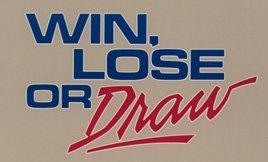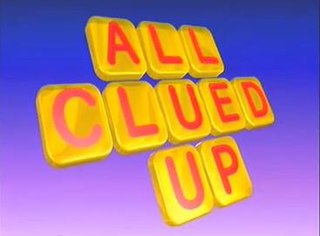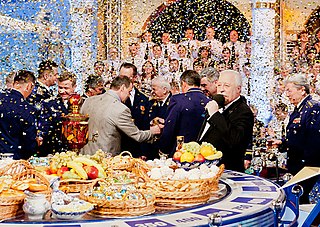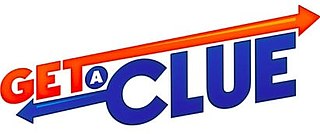
Lingo is an American television game show with multiple international adaptations. Contestants compete to decode five-letter words given the first letter, similarly to Jotto. In most versions of the show, successfully guessing a word also allows contestants to draw numbers to fill in a Bingo card.

Win, Lose or Draw is an American television game show that aired from 1987 to 1990 in syndication and on NBC. It was taped at CBS Television City, often in Studios 31, 33, and 43 at various times. It was co-produced by Burt & Bert Productions and Kline & Friends for Disney's Buena Vista Television. It has also had two versions on The Disney Channel: Teen Win, Lose or Draw from 1989 to 1992, and a revived version known as Disney's Win, Lose or Draw which aired in 2014. New York described Win, Lose or Draw as "a knockoff" of the board game Pictionary, however, Burt Reynolds and Ed McMahon referred to playing the game at Burt's home during the August 2, 1978 episode of The Tonight Show Starring Johnny Carson, three years before Pictionary was created.

Now You See It is an American television game show created by Frank Wayne for Mark Goodson-Bill Todman Productions. The object of Now You See It is to answer general knowledge trivia questions by finding the answers hidden in a grid, similar to a word search puzzle.

Chain Reaction is an American television game show created by Bob Stewart, in which players compete to form chains composed of two-word phrases.

The Cross-Wits is an American television game show. Two contestants, each paired with two celebrities, competed to fill in words in a crossword puzzle. It premiered on December 15, 1975, and lasted for five seasons until its cancellation on September 12, 1980. The show was hosted by Jack Clark, with Jerri Fiala as hostess. Announcing duties were handled by John Harlan, Jay Stewart, and Jerry Bishop. The show was produced by Ralph Edwards Productions and distributed by Metromedia Producers Corporation.

The $1,000,000 Chance of a Lifetime is an American game show which offered a $1 million (annuitized) grand prize to winning contestants. The show aired in syndication from January 6, 1986, until May 22, 1987. The show was hosted by Jim Lange, and he was joined by Karen Thomas as co-host during the second season. Mark Summers was the show's announcer for the first few weeks and Johnny Gilbert announced the remainder of the series. The show was produced by XPTLA, Inc., and distributed by Lorimar-Telepictures.
BrainTeaser was a British game show based on the original Dutch format of Puzzeltijd. The show was broadcast live, with phone-in viewer puzzles being announced and played during the show in addition to the studio game. During its run from 5 August 2002 to 7 March 2007, it aired on Five Mondays to Fridays, usually for an hour around lunchtime, and was fronted by various presenters rotating with one another. Beginning in August 2005, a version of the show that exclusively focused on viewer participation was broadcast in a four-hour long block on YooPlay TV every day after the Five broadcast, as part of a thirteen-week trial.

Blackout is an American game show that was broadcast on CBS as part of its daytime schedule from January 4, 1988 until April 1, 1988. The program was created and produced by Jay Wolpert. The game features two contestants, each paired with a celebrity. Contestants attempt to solve word puzzles consisting of a sentence or short paragraph with four blank spaces. Players guess each missing word based on hearing clues recorded by their partner, but with the playback being muted or "blacked out" at certain places by their opponent.

All Clued Up is a British game show based on the American version entitled The $1,000,000 Chance of a Lifetime. It aired on ITV from 16 April 1988 to 30 August 1991 and was hosted by David Hamilton.

The Field of Wonders is a Soviet, later Russian adaptation of the U.S. game show Wheel of Fortune produced by VID, provided with elements of Russian culture and hosted by Leonid Yakubovich.

Wheel of Fortune is a British television game show based on the American show of the same name created by Merv Griffin. Contestants compete to solve word puzzles, similar to those used in Hangman, to win cash and prizes. The title refers to the show's giant carnival wheel that contestants spin throughout the course of the game to determine their cash and/or prizes.

Password Plus and Super Password are American TV game shows that aired separately between 1979 and 1989. Both shows were revivals of Password, which originally ran from 1961 to 1975 in various incarnations. With only subtle differences between them, both Password Plus and Super Password retained the format of play as their predecessor, with two teams of two people each—a celebrity and a contestant—attempting to guess a mystery word using only one-word clues. A new feature included a series of five passwords as clues to an overarching puzzle for the teams to solve.

Stumpers! is a game show hosted by Allen Ludden that aired on NBC from October 4 to December 31, 1976. Lin Bolen, former head of NBC Daytime Programming, developed the show. Bill Armstrong was the program's regular announcer, with Charlie O'Donnell filling in for several episodes. The show featured game play similar to Password, with two teams attempting to guess the subject of puzzles based on clues provided by their opponents.
Jumble is a British game show that aired on ITV from 12 March 1991 to 4 September 1992 and is hosted by Jeff Stevenson.

Merv Griffin's Crosswords is an American game show based on crossword puzzles. The show was created by its namesake, Merv Griffin, who died shortly after beginning production on the series. Ty Treadway was the host, and Edd Hall was the announcer.
Wordplay is a game show presented by Jenny Powell and sometimes Jenni Falconer. It aired live weekdays from 23 March to 31 July 2009 on Channel 5 and was axed after only one series.
Download is an Australian children's game show which aired on the Nine Network from 2000 until 2002. Scott McRae hosted the first two seasons of the show in 2000–2001; he was replaced by Nathan Lloyd for the third season in 2001–2002, while Emily Jade O'Keefe hosted the fourth season of the show. The co-host for the fourth season was Miss Bytes.
Emogenius is an American game show that is broadcast by Game Show Network. The series features two teams of contestants who compete as teams against each other by decoding emoji-themed messages. The main game consists of three rounds of various themes. The team that accumulates the most money in the main game wins the game, keeps their bank, and advances to a bonus round, where their winnings can be increased to up to $10,000 if they can solve five messages within the time limit. The series was first announced March 17, 2017, it premiered nearly three months later on June 14, 2017. It is hosted by Hunter March, grandson of The $64,000 Question host Hal March.

Get a Clue is an American television game show hosted by Rob Belushi that aired on Game Show Network from January 6, 2020 to April 16, 2021.

People Puzzler is an American television game show hosted by Leah Remini and broadcast by Game Show Network as well as in syndication. It aired from January 18, 2021 to November 3, 2023. The show is inspired by the celebrity and pop-culture themed crosswords in People magazine.














